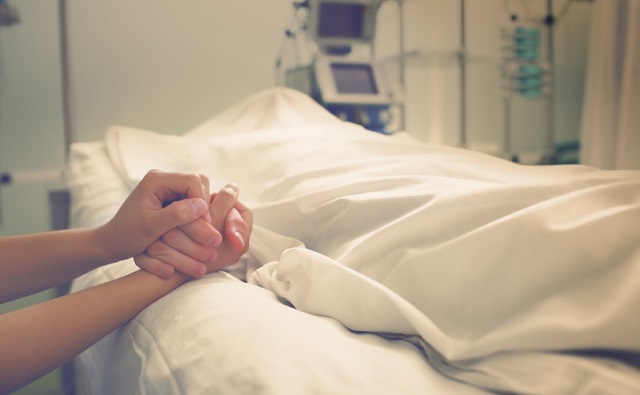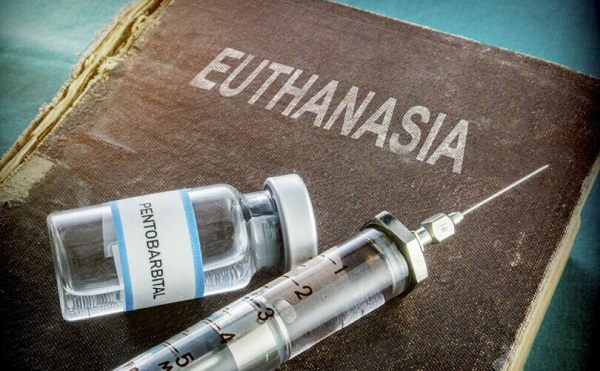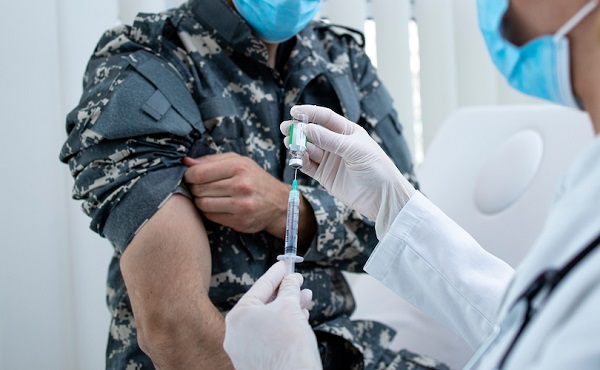MAiD
Canada’s euthanasia regime considers death less harmful than offering help to live

From LifeSiteNews
A Canadian judge has ordered an injunction from a father to be lifted so that his 27-year-old autistic daughter can be permitted to undergo a doctor-assisted suicide.
On March 14, I reported on the story of a 27-year-old Albertan woman with autism who had been approved for euthanasia in December; she was planning to receive a lethal injection on February 1 when her father, whom she lives with, successfully obtained a temporary court injunction the day prior. Her father argued that her autism and “possibly other undiagnosed maladies do not satisfy the eligibility criteria for MAiD [Medical Assistance in Dying]”; the daughter’s attorney argued that it was “none of [her father’s] business.”
It fell to Court of King’s Bench Justice Colin Feasby to examine the approval process and to determine whether the young woman was eligible for suicide-by-doctor. He admitted to being troubled by the case. “As a court, I can’t go second guessing these MAiD assessors… but I’m stuck with this: the only comprehensive assessment of this person done says she’s normal,” Feasby stated. “That’s really hard.” It shouldn’t have been.
The desperate father has received another brutal setback in his quest to save his daughter from Canada’s euthanasia regime. On March 25, Feasby ruled that the injunction preventing her death be lifted. As the Calgary Herald put it: “Preventing a Calgary woman’s medically assisted death would cause her irreparable harm, a judge ruled Monday.” Reread that sentence a moment and let it sink in: preventing a woman’s death would cause her irreparable harm. In Canada’s euthanasia regime, words mean nothing. Suicide is healthcare. Stopping suicide causes irreparable harm. Death… doesn’t, somehow.
“The harm to MV [the woman in question] if the injunction is granted goes to the core of her being,” Feasby stated in his written ruling. “An injunction would deny MV the right to choose between living or dying with dignity. Further, an injunction would put MV in a position where she would be forced to choose between living a life she has decided is intolerable and ending her life without medical assistance. This is a terrible choice that should not be forced on MV, as attempting to end her life without medical assistance would put her at increased risk of pain, suffering, and lasting injury.”
Note here that there is no limiting principle to this ruling. That logic, such as it is, would apply to any suffering person experiencing suicidal ideation. It is also a false choice. The choice is not between dying by lethal injection or dying by some other form of suicide; it is between dying by lethal injection or being cared for by her loving father, who is ready and willing to do whatever he can for her. As Feasby himself said in his previous comments on the case: “The only comprehensive assessment of this person done says she’s normal.” Apparently, that didn’t matter.
Addressing the young woman in his ruling, Feasby added:
What I know of your journey through the health-care system from the evidence in this case suggests that you have struggled to find a doctor who could diagnose your condition and offer appropriate treatment. I do not know why you seek MAiD. Your reasons remain your own because I have respected your autonomy and your privacy. My decision recognizes your right to choose medically assisted death; but it does not require you to choose death.
Keen readers will notice that these statements are also in conflict. The young woman “struggled to find a doctor who could diagnose your condition and offer appropriate treatment”; that is why she is seeking euthanasia. Feasby can pretend not to know this, but the evidence is clear.
Feasby did admit that his ruling would be deeply harmful to the parents of the young woman. “The harm to WV [the father] if the injunction is not granted will be substantial,” he wrote. “The pain of losing a child, even an adult child, is not something that any parent should experience. (The parents) have devoted their lives to raising MV from birth and have continued to support her since she has come of age. They will understandably be devastated by her death. For many parents, the loss of a child is a life-changing event that they never truly recover from. The loss is immeasurable.”
He is right. He could have made a different decision. The 27-year-old had to shop around for doctors willing to sign off on her application for euthanasia; she initially struggled to find the necessary two. But in the end, she succeeded. The father can appeal Feasby’s decision, but his attorney has not commented on whether he will do so. If he does not, he will face what so many Canadian families have endured over the past several years: the knowledge that his family member will expedite her death, and that he is helpless to stop it.
Alberta
Alberta government announces review of Trudeau’s euthanasia regime

From LifeSiteNews
Alberta announced it ‘is reviewing how MAID is regulated to ensure there is a consistent process as well as oversight that protects vulnerable Albertans, specifically those living with disabilities or suffering from mental health challenges.’
The Conservative provincial government of Alberta is pushing back against the Canadian federal government’s continued desire to expand euthanasia in the nation, saying it will launch a review of the legislation and policies surrounding the grim practice, including a period of public engagement.
The United Conservative Party (UCP) government under Premier Danielle Smith in a press release said the province needs to make sure that robust safeguards and procedures are in place to protect vulnerable people from being coerced into getting euthanatized under the MAiD (Medical Assistance in Dying) program.
“Alberta’s government is reviewing how MAID is regulated to ensure there is a consistent process as well as oversight that protects vulnerable Albertans, specifically those living with disabilities or suffering from mental health challenges,” said the government Monday.
The government said a online survey regarding MAiD open to all Albertans who have opinions about the deadly practice will be available until December 20.
“We recognize that medical assistance in dying is a very complex and often personal issue and is an important, sensitive and emotional matter for patients and their families,” said Alberta’s Minister of Justice and Attorney General Mickey Amery.
Amery said it is important to ensure this process has the “necessary supports to protect the most vulnerable.”
The government said that it will also be engaging with academics, medical associations, public bodies, as well as religious organizations and “regulatory bodies, advocacy groups” regarding MAiD
The government said all information gathered through this consultation will “help inform the Alberta government’s planning and policy decision making, including potential legislative changes regarding MAID in Alberta.”
When it comes to MAiD, Prime Minister Justin Trudeau’s Liberal government sought to expand it from the chronically and terminally ill to those suffering solely from mental illness.
However, in February, after pushback from pro-life, medical, and mental health groups as well as most of Canada’s provinces, the federal government delayed the mental illness expansion until 2027.
Alberta’s Minister of Mental Health and Addiction Dan Williams said that the UCP government has been “clear” that it does not “support the provision of medically assisted suicide for vulnerable Albertans facing mental illness as their primary purpose for seeking their own death.”
“Instead, our goal is to build a continuum of care where vulnerable Albertans can live in long-term health and fulfilment. We look forward to the feedback of Albertans as we proceed with this important issue,” he noted.
The Alberta government said that as MAiD is “federally legislated and regulated” it is main job will be to try and make sure that it protects “vulnerable individuals” as much as possible.
Alberta’s Minister of Health Adriana LaGrange reaffirmed that the Alberta government “does not support expanding MAID eligibility to include those facing depression or mental illness and continues to call on the federal government to end this policy altogether.”
The number of Canadians killed by lethal injection under the nation’s MAiD program since 2016 stands at close to 65,000, with an estimated 16,000 deaths in 2023 alone. Many fear that because the official statistics are manipulated the number may be even higher.
To combat Canadians being coerced into MAiD, which LifeSiteNews has covered, the combat pro-life Delta Hospice Society (DHS) is offering a free “Do Not Euthanize Defense Kit” to help vulnerable people “protect themselves” from any healthcare workers who might push euthanasia on the defenseless.
International
Euthanasia advocates use deception to affect public’s perception of assisted suicide

From LifeSiteNews
Politicians claim that moral opposition to assisted suicide (or suicide in general) and euthanasia is religiously motivated and then make the leap to insisting that this means such opposition should be ignored.
Euthanasia activists are currently doing what they do best: the bait and switch.
As the debate heats up in the U.K., all of the familiar tactics are on display. First, of course, there is the relentless lying. Despite the case study of Canada, the Netherlands, and Belgium – and despite disability activists, judges, palliative physicians, and the secretaries of health and justice warning that no “safeguards” will hold – U.K. euthanasia activists are insisting that this time everything will be different.
The response to these critiques has been predictable but infuriating. Euthanasia activists insist that all of this is about religion – that those nasty Christians are, once again, seeking to impose their suffering-based theology on the country. (This despite the fact that even Ann Furedi, who heads up the U.K.’s second largest abortion provider, opposes the proposed assisted suicide law.) One good microcosmic example of this tactic comes from UK writer Julie Street, who posted to X (formerly Twitter):
Just walked out of Mass bloody fuming – our priest used the homily to read a letter from the Catholic bishops telling people to oppose the Assisted Dying Bill then handed out cards with our local MP’s details on to lobby them. Religion has no place in politics or women’s rights.
There is much to say in response, of course. Why is Street so surprised to discover that her Catholic priest and bishops are, in fact, Catholic? Is she ignorant of the religion that she at least appears to practice? How airtight does one’s mind have to be not to see assisted suicide and euthanasia as religious issues? Indeed, “euthanasia” is Greek for “good death” – the theological premises are baked right into the term. Or does Street think that religious people should shut their mouths in the political arena and voluntarily disenfranchise themselves as the fates of the weak are decided?
Is Street also ignorant of the fact that it was largely due to the Catholic Church’s public opposition that Adolf Hitler moved the Nazi’s euthanasia operation underground? (We now know, of course, that the Nazis only claimed to have disbanded the T-4 program.) I thought progressives wanted a Church that stood up for the weak, vulnerable, and dispossessed – and who qualifies more than the sick, elderly, and those with disabilities? Christians are accused of not being loving enough, and then rebuked when they stand up for the victims the political class deems expendable – first the unborn, now those on the other end of life’s spectrum.
But there’s more to this tactic than grating ignorance. Progressives like to play both sides of the fence. Take abortion, for example. Politicians like to claim that it is a religious issue, and that thus they cannot legislate against it due to the fact that we live in pluralistic societies. Many religious leaders are quite happy to follow this logic, claiming that since abortion is a political issue, it cannot be discussed in church. And all the while, the countless corpses of the aborted unborn pile up in the No Man’s Land between.
The assisted suicide debate is unfolding along similar lines. Politicians claim that moral opposition to assisted suicide (or suicide in general) and euthanasia is religiously motivated and then make the leap to insisting that this means such opposition should be ignored. Meanwhile, because politicians are debating the issue, folks like Street can claim that because this is now a political issue, priests and pastors should keep their traps shut. See what they did there? It’s a neat trick, and despite how farcical and illogical it is, it seems to work with maddening regularity.
In fact, the priest Julie Street had the good fortune to hear was standing in the tradition of the clergy who stood up against Adolf Hitler and his eugenicist gang – and fighting the same evil being advanced under many of the same premises, to boot. She should be grateful. If she can’t manage that, she should at least be better educated.
-

 ESG2 days ago
ESG2 days agoCan’t afford Rent? Groceries for your kids? Trudeau says suck it up and pay the tax!
-

 John Stossel2 days ago
John Stossel2 days agoGreen Energy Needs Minerals, Yet America Blocks New Mines
-

 Daily Caller2 days ago
Daily Caller2 days agoLos Angeles Passes ‘Sanctuary City’ Ordinance In Wake Of Trump’s Deportation Plan
-

 Alberta2 days ago
Alberta2 days agoProvince considering new Red Deer River reservoir east of Red Deer
-

 Addictions2 days ago
Addictions2 days agoBC Addictions Expert Questions Ties Between Safer Supply Advocates and For-Profit Companies
-

 Aristotle Foundation1 day ago
Aristotle Foundation1 day agoToronto cancels history, again: The irony and injustice of renaming Yonge-Dundas Square to Sankofa Square
-

 armed forces1 day ago
armed forces1 day agoJudge dismisses Canadian military personnel’s lawsuit against COVID shot mandate
-

 conflict2 days ago
conflict2 days agoPutin Launches Mass-Production of Nuclear Shelters for his People







